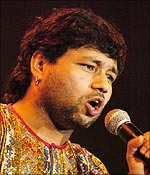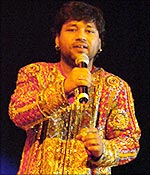 | « Back to article | Print this article |
A few hours before Kailash Kher took the stage at the Bollywood Music Awards, he sat in the lobby of the Trump Taj Mahal Casino in Atlantic City, calmly talking about destiny and the role it played in turning a failed businessman into a popular singer.
The man who has belted out hits such as O Sikandar for the film Corporate, is also responsible for Kailasa, one of the most successful albums of the last decade. Kher is not obsessed with success. He says he doesn't wonder about whether his next song or album is going to be as good. "I am worried if I will lose my bearing, my peace of mind, my dhyan (concentration) and the lessons my parents drilled into me," he adds.
Here, he tells Managing Editor Arthur J Pais about success, his inspirations and his dreams. Excerpts:
Whatever happened to your long hair and beard?
(Chuckles) It just shows how busy I have become. I got rid of both about six months ago.
For someone as busy as you, isn't it easier to sport both?
Not for someone in showbiz. It isn't easy to maintain the look all the time. I would rather shave every day.
When did you decide to be a singer?
I had the dream since childhood. But it was only about six years ago, when the textile business I was running failed, that I decided to leave New Delhi and try my luck in Mumbai, going into a very different field. I am glad the business failed and I could find my true vocation.
Did anyone predict the success you are enjoying today?
My father is an astrologer and told me a few years ago that I was going to enjoy tremendous success. I found it difficult to believe him and told him he was probably saying it only because he wanted to boost his son's morale. But, he knew what he was saying; there wasn't any uncertainty. He also told me it was important for me to keep my spirits up.
What kind of training did you have as a singer?
I listened to a lot of great songs by Mohammad Rafi and other singers during my childhood. Twenty years ago, there was hardly any opportunity to listen to much non-film music, as we do today. I admired Rafi and the rest, but also knew they had created their own magic. I wanted to go beyond it. I didn't want to be someone's clone. I wanted to create my own kind of singing and thought I would do well as a classical or semi-classical singer. I hadn't closed my mind to film songs though. I also grew up singing bhajans at home as my father (whom everyone called Pandit Mahashayji) was fond of singing religious songs.
 Who was your guru?
Who was your guru?
I had more than a dozen.
More than a dozen?
I am a sensitive person who believes criticism should be constructive. But a number of teachers I went to didn't have the gift of challenging me well, or, when I made a mistake, to guide me. I also felt discouraged by the class system. Often, the children of the rich got better treatment. The teachers would make a big fuss over them. So, I would like to say that I am, in a way, self-trained but with the divine hand guiding me all through.
Who inspired you, if not the gurus?
The legends, from Pandit Kumar Gandharva to Ustad Ghulam Ali Khan. Pandit Bhimsen Joshi is another giant. These are yesterday's legends. As I listened to them, they became my gurus.
Did you have anyone help you when you arrived in Mumbai?
(Laughs) I didn't even know what Mumbai looked like, except for what I had seen in Hindi films. I learned a few names like Borivali and Andheri because I heard people mention them on local trains. I had few friends in the city and slept on the footpaths (sidewalks) for several days.
How did you manage?
Whenever I felt desperate, I remembered what my father had said. The faith my friend Prashank Bindal and my brother Mahesh had in me also helped. They are the ones who told me I should seriously try my luck in Mumbai. Naturally, I had a lot of optimism and went around knocking one door after another. Slowly, I got around to singing jingles. The composers Salim-Suleiman gave me a break.
One of the first people to give work was Ismail Darbar. I got to sing a few lines with Sunidhi Chauhan in the film Baaz. But the song, like the film, went unnoticed. My early opportunities included films such as Andaaz [in 2003]. The song Allah Ke Bande, composed by Vishal Dadlani, became a hit in 2003 even though the film Waisa Bhi Hota Hain II did not. Then, songs in films such as The Rising: Legend of Mangal Pandey and Corporate [O Sikander] followed. By now, I have sung for more than 40 films, most of them in the last two years.
Apart from the title song, you also sang a number of songs in Mangal Pandey, including the qawwali. How did that come about?
I say there was some sort of miracle that got me into contact with A R Rahman. He wanted me to sing for Meenaxi. As we discussing the music for that film, he suddenly asked me if I knew rousing songs that could be used in a battlefield sequence. I sang a song I had heard from my father. He was so impressed that he got it recorded, and proceeded from there, creating his own melody. The qawwali is very special to me, partially because it was filmed on me. But the song itself is spellbinding. It calms you; it lets your spirit rise in a beautiful way. Whenever I hear it, I am transported to another world.
Rahman once told me that while many singers faithfully sang his songs I was among the few who somehow surprised him at the time of the recording by bringing some magic to the track. Like they say, you don't sing from your throat. Your voice comes from the gut, from the navel.
(Closes his eyes for a minute) What can be a greater compliment?
What is working with Rahman like?
I recently recorded a song in Kannada for Rahman. Whether I work with him or not, I feel it is my fortune to know him. If I were to sit next to him, even without knowing he was a composer, I would still get beautiful vibrations. It is a spiritual experience.
What have you learned from him?
I continue learning endlessly. I learn from his humility. I learn how to treat artists with respect, how to inspire singers and lyricists. I wish I had a teacher like him when I went from one guru to another in my early days.
You are hugely popular as a singer outside films, too. Your album Kailasa has had phenomenal success. Did you also compose the songs?
I worked on their composition apart from writing a few lines here and there. There will be another Kailasa within a year. The musical journey will continue.
It must be a very different feeling when you sing for others.
It is. Composers and lyricists will bring their own perspective. When I work for others, I have to be very careful to remember that I am not the composer. I remind myself to be careful and not overshadow the composers.
 What kind of emotions did you undergo while creating the music of Kailasa?
What kind of emotions did you undergo while creating the music of Kailasa?
I felt it was like a natural flow of madness. I was possessed. Everything happened spontaneously though, like I was going with the flow of a river.
What are some of the films with your songs that we should look forward to?
I will surely miss a few names but, thinking fast, I have an awesome song in Salaam E Ishq composed by Shankar-Ehsaan-Loy. In Baabul, I join Amitabh Bachchan on a song composed by Aadesh Srivastava.
You were a newcomer a few years ago. Are you working with new composers?
I always look forward to working with new talent. There is certainly a thrill working with someone who is taking the first few steps but knows what he is doing. I have a lovely song about lovesickness in a film called Hostel, composed by two artists. The song Chak De, which has become a huge hit, was made for a small film, Khosla Ka Ghosla, by composers Bapi-Tutul. I also expect them to rise very fast.
Do you find it difficult to handle success?
(Smiles) I remember my days of struggle -- they will make sure I am not a slave to pride.
Photographs: Paresh Gandhi